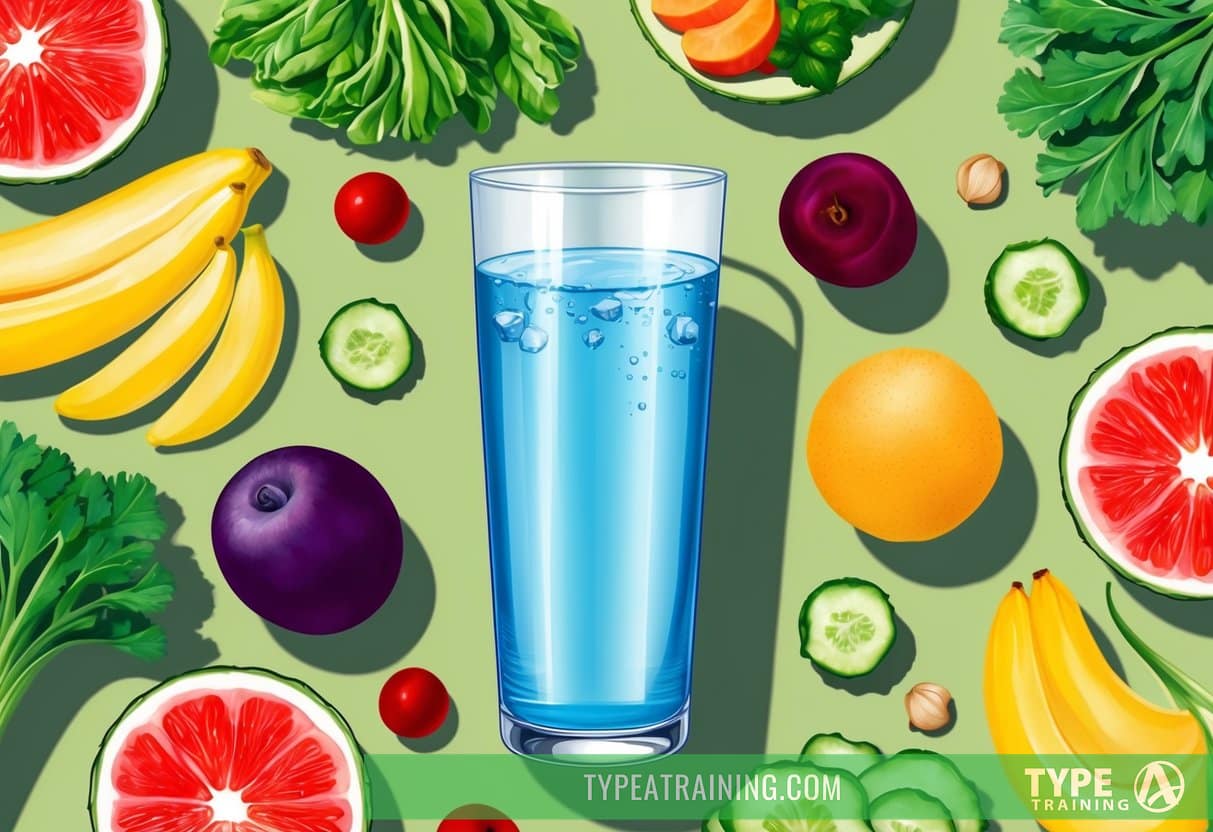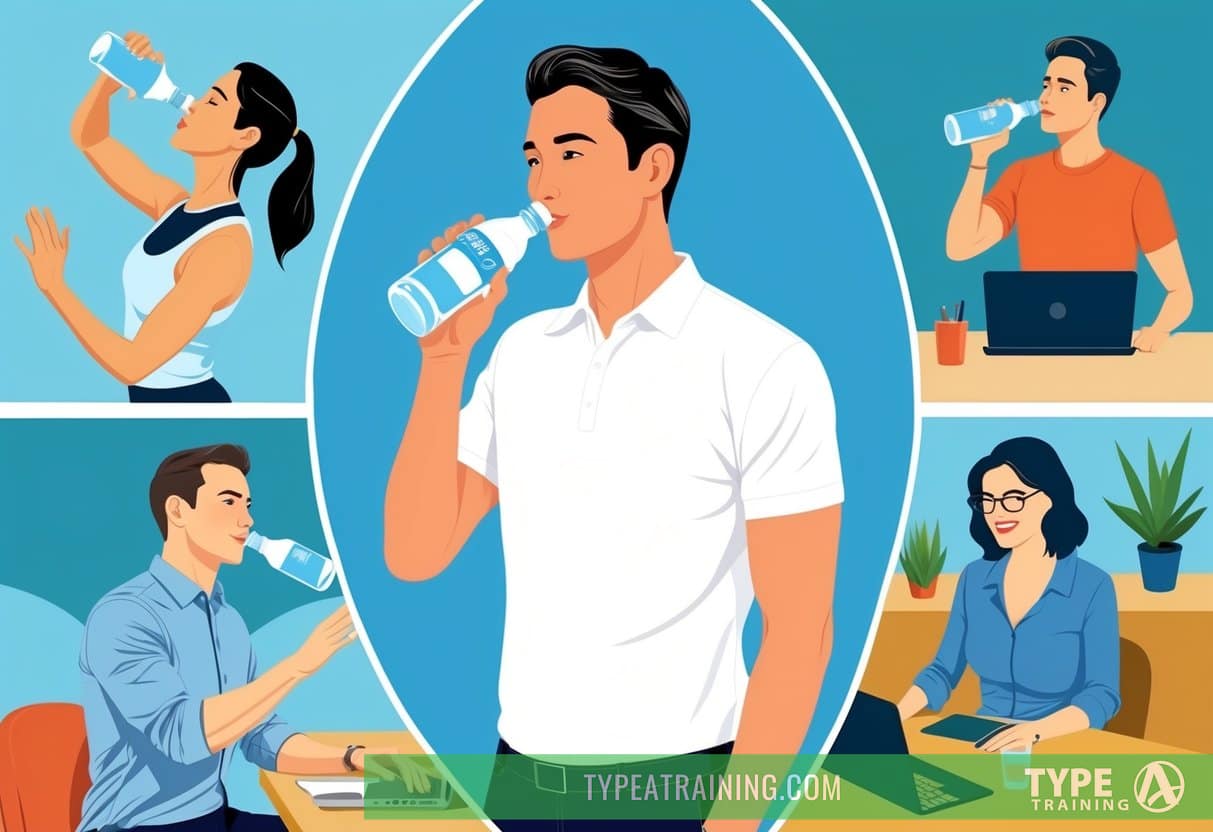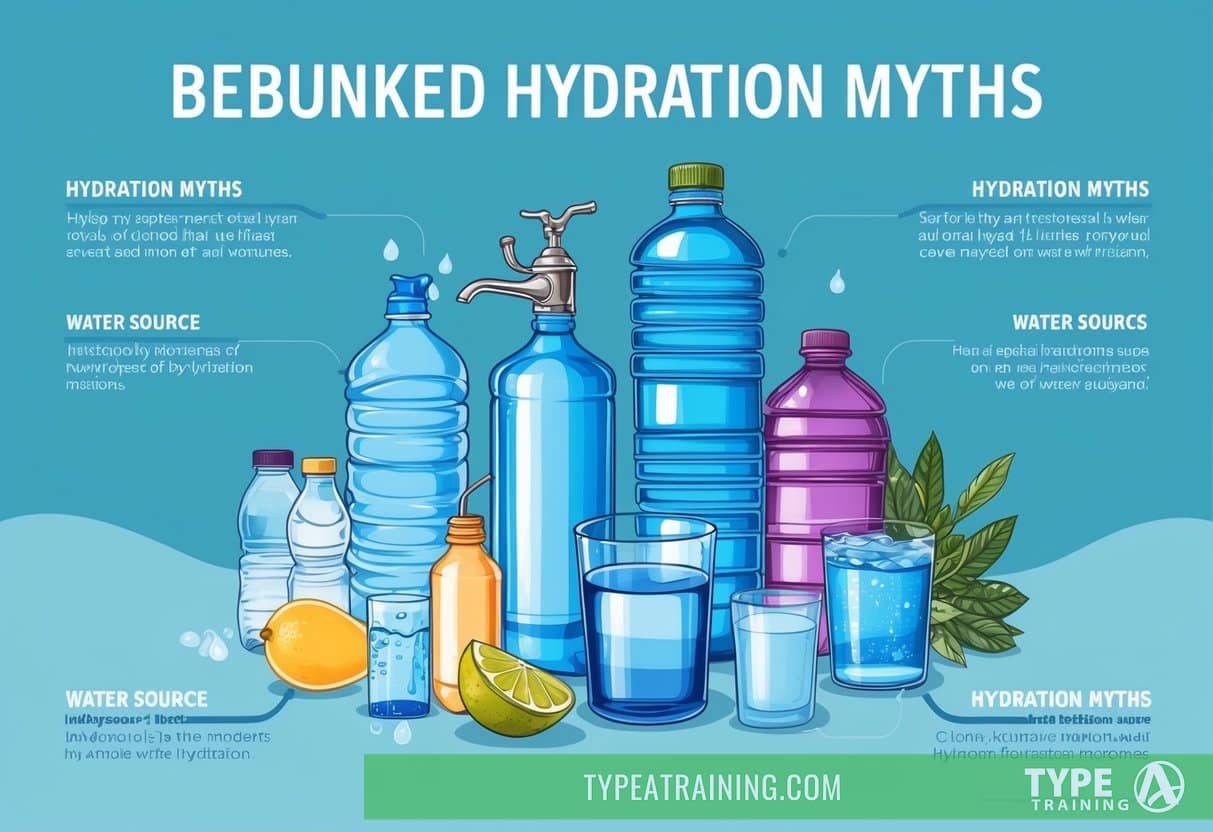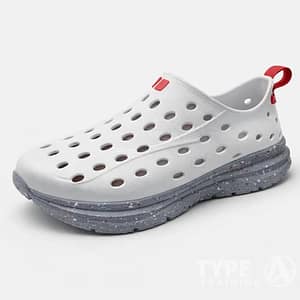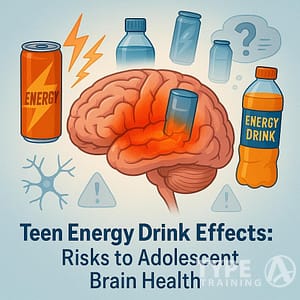Staying hydrated is crucial for our health, but many misconceptions surround water consumption and its effects on our bodies. You might have heard that you need to drink eight glasses of water daily or that caffeine dehydrates you. The truth about hydration is more nuanced than these common myths suggest.
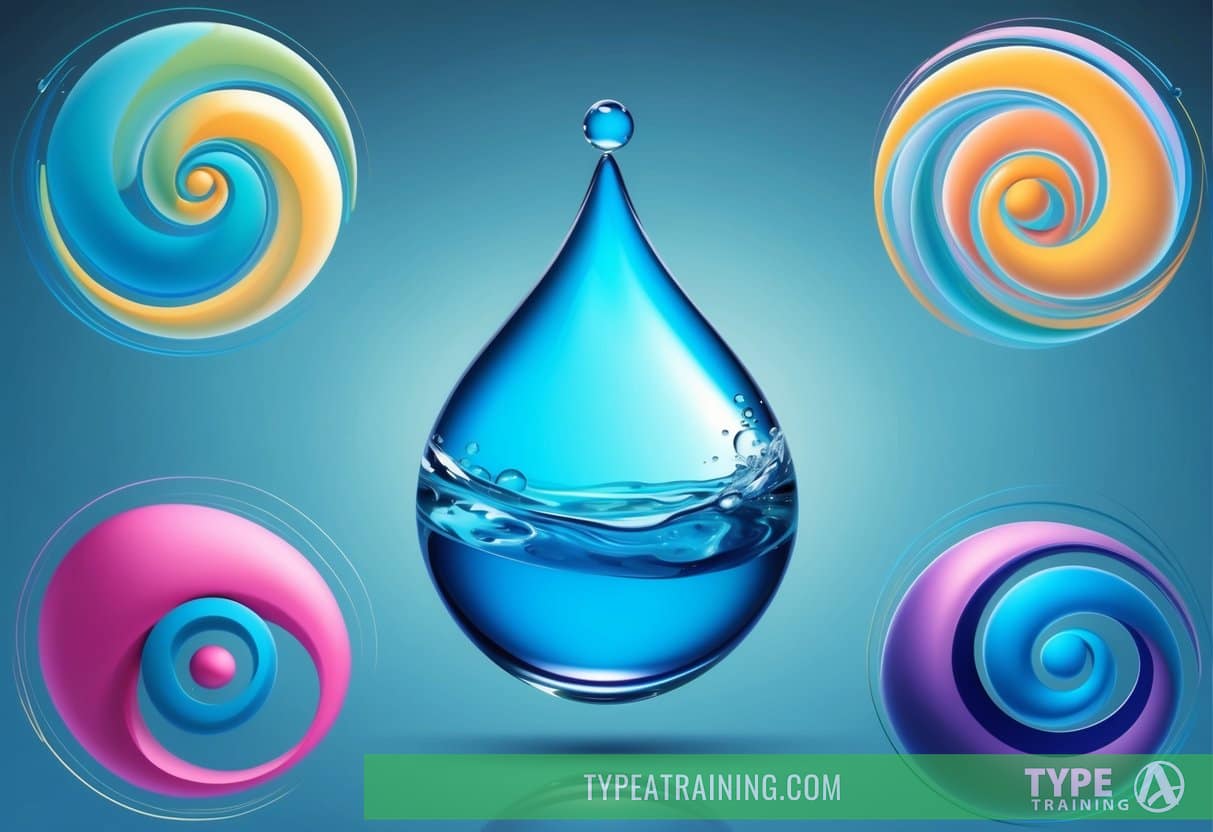
Understanding the facts about hydration can help you make better choices for your health.
Did you know that your body obtains about 20% of its fluids from the foods you eat? Cucumbers, strawberries, and watermelon are excellent sources of hydration.
Popular posts:
Contrary to popular belief, caffeinated beverages like coffee can contribute to your daily fluid intake without causing significant dehydration.
Key Takeaways
- Your hydration needs vary based on factors like activity level and climate.
- Many foods and beverages contribute to your daily fluid intake.
- Listening to your body’s thirst cues is often more effective than following strict hydration rules.
Understanding Hydration
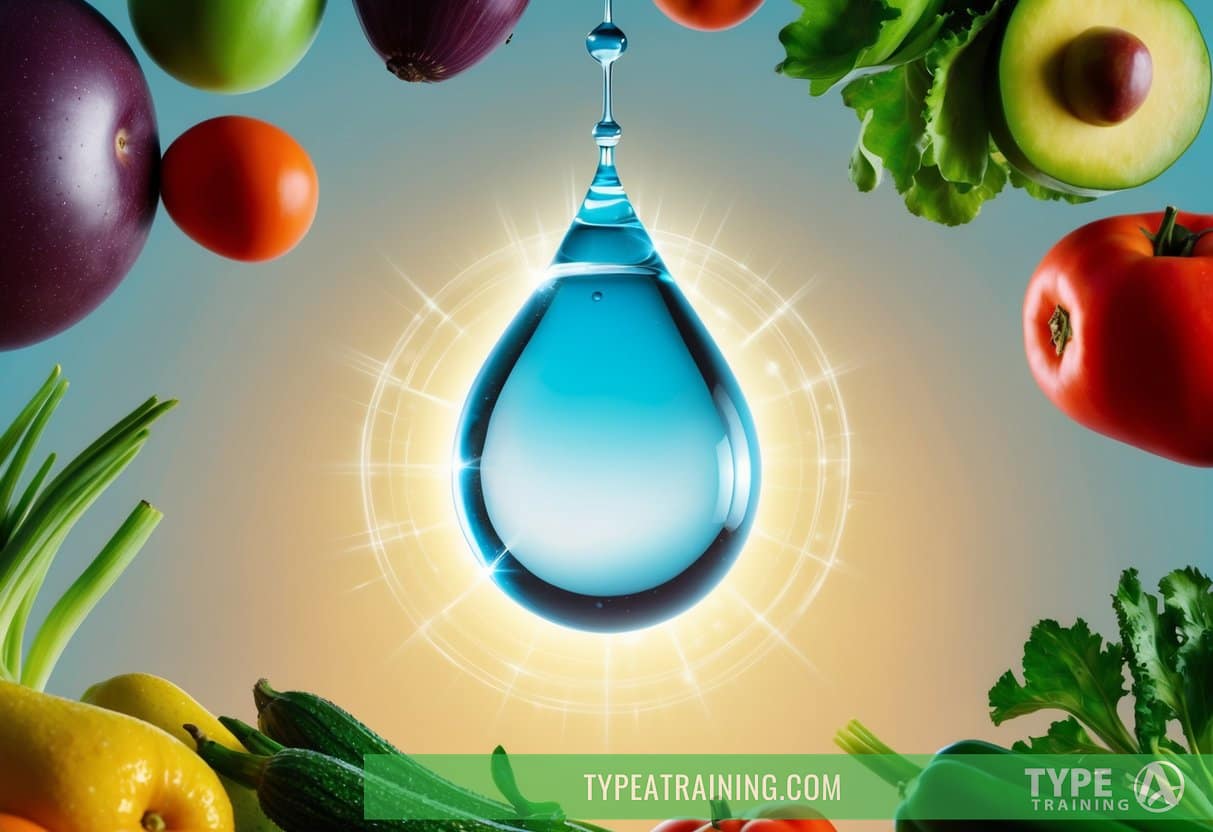
Proper hydration is essential for optimal bodily functions and overall health. Water plays a crucial role in various physiological processes, and maintaining the right balance of fluids and electrolytes is key to staying hydrated.
The Role of Water in the Body
Water is vital for nearly every bodily function. It regulates body temperature, transports nutrients, and removes waste products.
Your body is composed of about 60% water, with some organs containing even higher percentages.
Water helps lubricate joints, protect sensitive tissues, and maintain proper blood volume. It’s also crucial for digestion, absorption of nutrients, and circulation.
Without adequate water intake, your body can’t perform these functions efficiently. This is why staying hydrated is so important for your overall health and well-being.
Hydration vs. Dehydration
Hydration refers to the process of providing your body with sufficient fluids to function properly. Dehydration occurs when you lose more fluids than you take in.
Mild dehydration can cause fatigue, headaches, and decreased physical performance. Severe dehydration can lead to serious health problems, including heat exhaustion, kidney problems, and in extreme cases, death.
Your hydration needs vary based on factors like age, activity level, climate, and overall health. Drinking water throughout the day is generally recommended, but the exact amount depends on individual circumstances.
Electrolytes’ Part in Hydration
Electrolytes are minerals in your blood and other bodily fluids that carry an electric charge. They play a crucial role in hydration by:
- Regulating nerve and muscle function
- Balancing blood acidity and pressure
- Helping rebuild damaged tissue
Key electrolytes include:
- Sodium
- Potassium
- Calcium
- Magnesium
- Chloride
These minerals work together with water to maintain proper fluid balance in your body.
During intense exercise or in hot conditions, you lose electrolytes through sweat, which is why sports drinks containing electrolytes can be beneficial in these situations.
Recognizing Dehydration Symptoms
Identifying the signs of dehydration early is crucial for maintaining your health. Common symptoms include:
- Thirst
- Dark-colored urine
- Dry mouth and lips
- Fatigue
- Dizziness
- Headache
- Decreased urine output
In more severe cases, you might experience:
- Rapid heartbeat
- Confusion
- Sunken eyes
- Lack of skin elasticity
It’s important to note that thirst isn’t always a reliable indicator of hydration status. By the time you feel thirsty, you may already be mildly dehydrated. Paying attention to your urine color and overall well-being can help you stay properly hydrated.
Debunking Hydration Myths
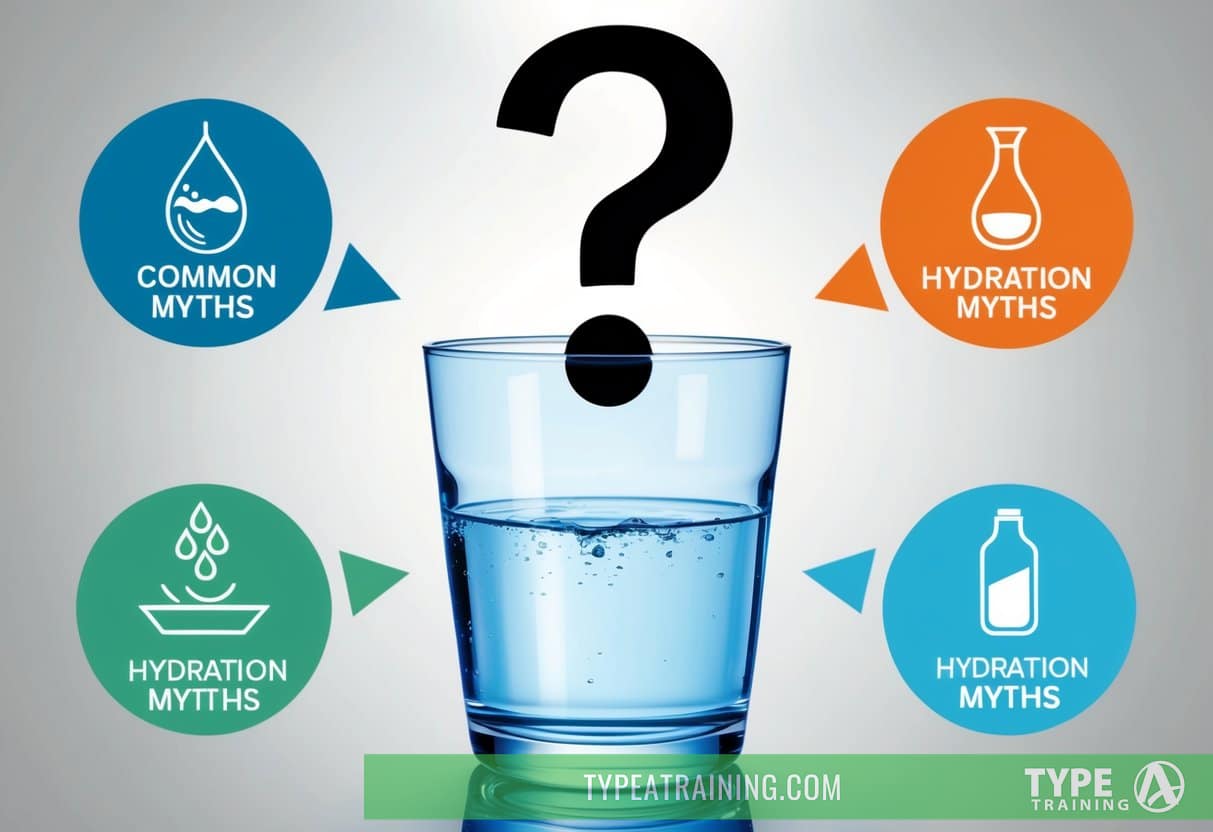
Common misconceptions about hydration can lead to confusion and potentially harmful practices. Let’s examine some prevalent myths and uncover the truth about proper hydration.
Myth: Everyone Needs 8 Glasses of Water a Day
The “8×8 rule” suggesting you need 8 glasses of water daily is oversimplified. Your hydration needs vary based on factors like activity level, climate, and diet.
A more accurate approach is to drink when thirsty and aim for pale yellow urine. For many, this may be less than 8 glasses. Others, especially athletes or those in hot climates, may need more.
Consider your diet too. Foods like fruits and vegetables contribute to your daily fluid intake. Listen to your body and adjust your water consumption accordingly.
Myth: Thirst Is a Late Sign of Dehydration
Contrary to popular belief, thirst is not a last-resort signal of severe dehydration. It’s actually your body’s early warning system, prompting you to drink before you become significantly dehydrated.
When you feel thirsty, you’re likely only 1-2% dehydrated. This level doesn’t typically impair performance or health. Waiting until you’re thirsty to drink is generally a safe and effective strategy for most people.
However, in extreme conditions or during intense exercise, you might need to drink before feeling thirsty. Elderly individuals may also have a diminished thirst response and should be mindful of regular fluid intake.
Myth: Drink Water to Lose Weight
While staying hydrated is important for overall health, drinking more water alone isn’t a magic solution for weight loss. Water can help you feel full temporarily, potentially reducing calorie intake if consumed before meals.
However, it doesn’t directly burn fat or significantly boost metabolism. The idea that cold water burns extra calories as your body warms it up is true, but the effect is minimal.
For sustainable weight loss, focus on a balanced diet and regular exercise. Adequate hydration supports these efforts but isn’t a substitute for them. Replace high-calorie beverages with water to reduce overall calorie intake.
Myth: Urine Color Always Indicates Hydration
While urine color can be a helpful indicator of hydration status, it’s not foolproof. Pale yellow urine generally suggests good hydration, but other factors can affect urine color.
• Certain foods (e.g., beets, blackberries)
• Medications
• Vitamins (especially B vitamins)
• Medical conditions
These can alter urine color regardless of hydration status. Very clear urine might indicate overhydration, while dark urine could suggest dehydration or other issues.
Use urine color as a general guide, but don’t rely on it exclusively. Consider how you feel, your thirst levels, and your overall fluid intake for a more comprehensive assessment of your hydration status.
Myth: Caffeinated Beverages Cause Dehydration
Caffeine’s diuretic effect doesn’t significantly impact hydration. Coffee, tea, and other caffeinated drinks can contribute to your daily fluid intake.
While caffeine may increase urine production slightly, the fluid in these beverages more than compensates for any losses. Regular caffeine consumers develop a tolerance to its diuretic effects.
Moderate caffeine intake (up to 400mg daily for most adults) shouldn’t cause dehydration. However, very high doses might have a more pronounced diuretic effect. As with all things, moderation is key.
Myth: More Water is Always Better
Drinking excessive amounts of water can be harmful. Overhydration, or water intoxication, can dilute essential electrolytes in your body, leading to a dangerous condition called hyponatremia.
Symptoms of overhydration include:
• Nausea and vomiting
• Headache
• Confusion
• Seizures (in severe cases)
Athletes in endurance events are at higher risk of overhydration if they drink too much water without replacing electrolytes. For most people, drinking to thirst and eating a balanced diet provides adequate hydration without risking overhydration.
Myth: Hydration is only important in hot weather
Proper hydration is crucial year-round, not just during summer months. Cold weather can be deceptively dehydrating due to:
• Increased urine production in cold environments
• Respiratory fluid loss from breathing dry, cold air
• Reduced thirst sensation in cold temperatures
Winter activities like skiing or hiking can lead to significant fluid loss through sweat, even if you don’t feel hot. Indoor heating in winter can also create a dry environment, increasing fluid needs.
Stay vigilant about hydration regardless of the season. In colder weather, warm beverages can help maintain both hydration and body temperature.
Myth: All fluids count towards hydration
While many fluids contribute to hydration, not all are equally beneficial. Water is the ideal choice for most hydration needs. Other good options include:
• Herbal teas
• Low-fat milk
• Fruits and vegetables with high water content
Limit intake of sugary drinks, alcohol, and very salty beverages. These can have diuretic effects or contribute excess calories and sodium to your diet.
Sports drinks are beneficial during intense exercise lasting over an hour but aren’t necessary for everyday hydration. Coconut water is a natural alternative but watch for added sugars in some brands.
Healthy Beverage Choices
Staying hydrated is crucial for overall health, but water isn’t the only option. Various beverages can contribute to your daily fluid intake while offering additional nutritional benefits.
Assessing the Benefits of Beverages
When choosing beverages, consider their nutritional value and hydration potential. Water remains the gold standard for hydration, but other drinks can complement your intake.
Milk provides essential nutrients like calcium and vitamin D. Unsweetened tea offers antioxidants and mild caffeine. Fresh fruit juices deliver vitamins and minerals, though they’re high in natural sugars.
Be mindful of added sugars and artificial ingredients in packaged drinks. Always check labels to make informed choices. Limit sugary sodas and energy drinks, as they can lead to weight gain and dental issues.
Remember, your beverage choices impact more than just hydration. They can influence your energy levels, nutrient intake, and long-term health.
Healthy Alternatives to Water
While water is essential for hydration, you have several healthy alternatives to vary your fluid intake. Here are some options:
- Herbal teas: Caffeine-free and rich in antioxidants
- Infused water: Add fruits, vegetables, or herbs for flavor
- Low-fat milk: Provides calcium, protein, and vitamins
- Vegetable juices: Nutrient-dense with lower sugar content than fruit juices
Sparkling water can be a refreshing option if you crave carbonation. Add a splash of 100% fruit juice for taste without excessive sugar. Coconut water offers natural electrolytes, making it a good choice after light exercise.
Limit your intake of sugary drinks and artificial sweeteners. These can lead to weight gain and don’t provide significant nutritional benefits.
The Truth About Sports Drinks
Sports drinks are marketed as essential for athletes, but their necessity depends on your activity level. For most people, water is sufficient for everyday hydration and light exercise.
Sports drinks contain electrolytes and carbohydrates, which can be beneficial during intense, prolonged exercise lasting over an hour. They help replenish lost minerals and provide quick energy. However, they also contain added sugars and calories.
For regular workouts, water is usually enough. If you’re exercising for less than an hour, you don’t typically need the extra electrolytes or calories from sports drinks.
Consider making your own electrolyte drink with water, a pinch of salt, and a squeeze of lemon. This provides similar benefits without added sugars or artificial ingredients.
Analyzing the Diuretic Effect of Drinks
Contrary to popular belief, not all caffeinated beverages are dehydrating. While caffeine has a mild diuretic effect, the fluid in coffee and tea more than compensates for any water loss.
Moderate consumption of caffeinated beverages can contribute to your daily fluid intake. However, excessive caffeine intake may lead to jitters, anxiety, and sleep disturbances.
Alcohol, on the other hand, has a stronger diuretic effect. It suppresses a hormone that helps your body retain water, leading to increased urination and potential dehydration. Always balance alcoholic drinks with water to maintain hydration.
Energy drinks often combine caffeine with sugar, which can have a more pronounced diuretic effect. Limit these drinks and opt for healthier alternatives when possible.
Why Coconut Water is a Great Choice
Coconut water has gained popularity as a natural sports drink alternative. It’s low in calories and rich in potassium, making it an excellent choice for hydration and electrolyte replenishment.
Key benefits of coconut water include:
- Natural electrolytes (potassium, sodium, magnesium)
- Low in calories compared to many sports drinks
- No artificial additives or preservatives
- Refreshing taste
While coconut water is a healthy option, it’s not necessarily superior to water for everyday hydration. It can be a good choice after light to moderate exercise or as an occasional alternative to sugary drinks.
Be aware that some brands add sugar or flavors. Always check the label to ensure you’re getting pure coconut water. If you have kidney problems or are on a potassium-restricted diet, consult your doctor before regularly consuming coconut water.
The Impact of Lifestyle on Hydration
Your daily activities and life stage significantly influence your hydration needs. Proper fluid intake is crucial for maintaining optimal health and performance across various lifestyle factors.
Physical Activity and Hydration
Exercise increases your body’s water requirements. During physical activity, you lose fluids through sweat and respiration. The amount of fluid loss depends on the intensity and duration of exercise, as well as environmental conditions.
For moderate exercise lasting less than an hour, water is usually sufficient for rehydration. However, for intense workouts or those lasting longer than 60 minutes, you may need sports drinks to replenish electrolytes.
To stay properly hydrated during exercise:
- Drink 17-20 oz of water 2-3 hours before exercising
- Consume 7-10 oz of fluid every 10-20 minutes during activity
- Drink 16-24 oz of fluid for every pound lost after exercise
Hydration for Weight Management
Proper hydration plays a role in weight management. Drinking water can help you feel full, potentially reducing calorie intake. Some studies suggest that increased water consumption may boost metabolism slightly.
When trying to lose weight:
- Drink a glass of water before meals to help control portion sizes
- Replace high-calorie beverages with water
- Stay hydrated to support your body’s metabolic processes
While water alone won’t cause significant weight loss, it’s a crucial component of a healthy weight management plan.
Hydration in Older Adults
As you age, your body’s ability to conserve water decreases, and your sense of thirst may become less acute. This puts older adults at a higher risk of dehydration.
Factors affecting hydration in older adults include:
- Reduced kidney function
- Certain medications that act as diuretics
- Mobility issues that may limit access to fluids
To maintain proper hydration as an older adult:
- Keep water easily accessible
- Set reminders to drink fluids regularly
- Consume water-rich foods like fruits and vegetables
Monitoring urine color is a simple way to check hydration status. Pale yellow urine generally indicates good hydration, while dark yellow or amber urine suggests you need to increase your fluid intake.
Optimizing Your Hydration
Proper hydration is essential for optimal health and performance. Understanding your individual needs and incorporating various strategies can help you maintain fluid balance effectively.
Tailoring Your Fluid Needs
Your daily fluid requirements depend on several factors. Age, sex, activity level, climate, and health conditions all influence how much you should drink.
A good starting point is to drink when you’re thirsty and aim for pale yellow urine. For many adults, this translates to about 8-10 cups (64-80 ounces) of fluids per day.
During exercise or hot weather, increase your fluid intake to compensate for sweat loss. Weigh yourself before and after workouts to gauge how much you need to replenish.
Food Sources for Hydration
Beverages aren’t the only way to stay hydrated. Many foods contribute significantly to your daily fluid intake.
Fruits and vegetables with high water content include:
- Watermelon (92% water)
- Cucumber (96% water)
- Strawberries (91% water)
- Lettuce (95% water)
These foods also provide essential nutrients and electrolytes like potassium, which help maintain fluid balance in your body.
Soups, broths, and smoothies are other excellent sources of hydration. Incorporating these into your diet can boost your overall fluid intake.
Understanding Sweat Rate
Knowing your sweat rate helps you replace fluids more accurately during exercise. To calculate it:
- Weigh yourself before exercise (without clothes)
- Exercise for one hour
- Weigh yourself again (without clothes)
- Subtract your post-exercise weight from your pre-exercise weight
The difference is roughly equivalent to your sweat loss in pounds. One pound equals about 16 ounces of fluid.
Your sweat rate varies based on exercise intensity, duration, and environmental conditions. Adjust your fluid intake accordingly to maintain healthy hydration.
Guidelines from Health Authorities
The Institute of Medicine provides general recommendations for daily fluid intake:
- Men: 15.5 cups (3.7 liters) of fluids
- Women: 11.5 cups (2.7 liters) of fluids
These guidelines include fluids from all sources, including food and beverages. Remember, individual needs may vary.
The American College of Sports Medicine suggests drinking 16-20 ounces of water 4 hours before exercise and 8-12 ounces 10-15 minutes before activity.
During exercise, aim to drink 3-8 ounces every 15-20 minutes, depending on your sweat rate and exercise intensity.
Frequently Asked Questions
Proper hydration involves more nuance than commonly believed. Individual needs vary based on factors like activity level, climate, and overall health. Let’s address some key questions about water intake and hydration.
What are the actual daily water intake recommendations?
The 8 glasses a day rule is a myth. Your water needs depend on various factors. The National Academies of Sciences, Engineering, and Medicine suggest about 11.5 cups (2.7 liters) daily for women and 15.5 cups (3.7 liters) for men, including fluids from food.
These are general guidelines. Your specific needs may differ based on exercise, environment, and health conditions.
Can drinking too much water be harmful?
Yes, excessive water intake can lead to a condition called hyponatremia. This occurs when sodium levels in your blood become diluted, potentially causing serious health issues.
Symptoms of hyponatremia include nausea, headaches, and in severe cases, seizures or coma. It’s rare but can affect endurance athletes or those with certain medical conditions.
Is it necessary to drink water even when not feeling thirsty?
Thirst isn’t always a reliable indicator of hydration status. By the time you feel thirsty, you may already be slightly dehydrated.
It’s wise to drink water regularly throughout the day, especially during physical activity or in hot weather. Pay attention to other signs like urine color, which should be pale yellow.
Does coffee or tea contribute to dehydration?
Contrary to popular belief, coffee and tea do not significantly contribute to dehydration. While caffeine has a mild diuretic effect, the fluid in these beverages still contributes to your daily water intake.
Moderate consumption of caffeinated drinks can be part of a healthy hydration strategy. However, water remains the best choice for staying hydrated.
Are sports drinks more hydrating than water?
For most people engaging in moderate exercise, water is sufficient for hydration.
Sports drinks can be beneficial during intense, prolonged exercise lasting more than an hour. These drinks contain electrolytes and carbohydrates that can help replenish what’s lost through sweat.
For everyday hydration, plain water is typically the best choice.
Is the quality of water significantly different depending on the source?
Tap water can be just as hydrating as bottled water.
In most developed countries, tap water is safe and meets strict quality standards.
Bottled water isn’t necessarily better. It’s often more expensive and has environmental impacts.
If you’re concerned about tap water quality, consider using a water filter.
